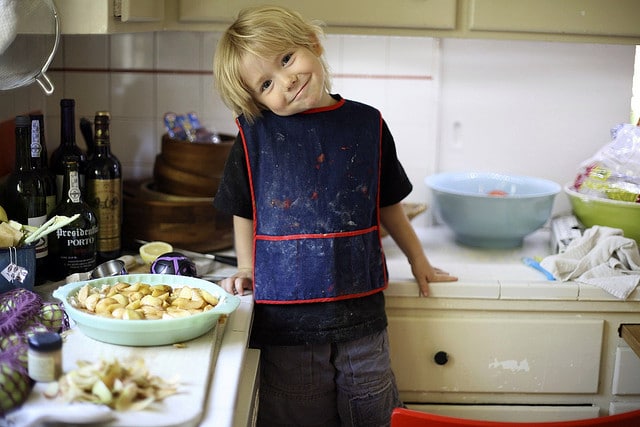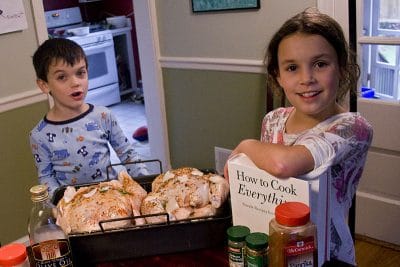National Kids Take Over the Kitchen Day is September 13. The Young Chef’s Academy sponsors the holiday and encourages kids to “take over the kitchen” and make a meal for their families. With supervision, this holiday could be a fun way to teach your children new skills.
With mini cooks in the kitchen comes the need for a review of kitchen safety. Cooking is the leading cause of house fires and injuries. The danger of the kitchen doesn’t leave you defenseless, however. Here are tips for safety-proofing your home so you and your kids can enjoy your National Kids Take Over the Kitchen Day.
Table of Contents
Fire Safety
Fires can start in many places: ovens, stoves—gas or electric. Wherever the place, fires escalate quickly. The shock of a sudden flame could cause you to panic and forget your training. But try to remain calm because your attitude, smart thinking, and action can save your life.
If you think you are losing control or if you do not know how to react, call 9-11 immediately. If possible, turn off your appliance, then get everyone out of the house. Practice escape routes calmly with your family now so everyone knows how to get to safety in case of an emergency.
Stopping Grease Fires
Watch your food while you’re cooking so it doesn’t burn and start a fire. Keep hot oil at a safe temperature. Even small pops of oil can hurt or burn. Most oils and fats smoke at temperatures ranging from 325 to 510 degrees Fahrenheit. And that’s before flames even start.
In case of a grease fire, don’t panic. You can stop it. Cut off the flames’ oxygen supply by covering the pan with a metal lid or baking sheet. Turn off the burner and remove the pan from the burner.
Never try to carry a pot or pan of hot oil, even if it isn’t ablaze. You could easily dump or splash the grease fire onto anything or anyone during your run outside.
Baking soda or salt can also stop a fire—but sprinkle, don’t dump. Do not use flour or baking powder. They could cause an explosion.
Cooking Skills
You can avoid a lot of accidents by learning correct cooking and cleaning skills. Use tools correctly and teach your kids to do the same. Show them proper technique and care for tools and utensils, especially dangerous ones like knives.
Also, teach kids to wash their hands and utensils often to fight germs and avoid cross-contamination. Even cooking or cutting things on the same surfaces could spread germs or cue allergic reactions, like it did with the chef in this story.
Watch where your kids put their hands. They could be in a hurry to grab a sample of something you’re slicing. They could just be impatient to use a ready ingredient. But their hands could easily get in the way of your knife before you notice or have time to react.
Make sure you and all your little cooks clean up after yourselves. Wipe up spills on floors and counters to avoid slips and messes. Clean cooking tools and utensils to avoid cross-contamination and other health hazards. Cleanliness will help you feel safe and confident as you help your kids learn to cook.
Use Your Resources
Test fire alarms monthly and replace their batteries every six months. Buy and install a carbon monoxide alarm if you don’t have one already, and test it regularly as well. These simple installments could alert you to a potential threat so you can take action.
You can be your own resource. Make it a habit to check and double-check that all kitchen appliances are turned off after you are finished using them. Be alert. Be prepared to stop a flame before it catches onto a misplaced towel or apron.
Unplug and put away small appliances such as skillets or toasters to keep your kitchen clutter-free and zap-free. You do not want children playing with overhanging plugs. Even a small tug could send a hot appliance over the edge.
Consider installing drawer or cabinet locks so your children can’t access dangerous kitchen tools or chemicals that could harm them.
Know the number for poison control and other emergency contact numbers. You hope to never have to use them, but you don’t want to be unprepared.
No matter what precautions you take, accidents happen. Try not to panic. A clear mind will help you stay safe in case of an accident. Try and remember what you’ve learned about safety, but know that trained professionals are available as well.
You don’t have to do everything alone. Even National Kids Take Over the Kitchen Day is a reminder of that.
See our Pinterest board or Daily Celebration’s Pinterest board for ideas on easy recipes you could help your children make for this holiday.
| woodley wonderworks |

